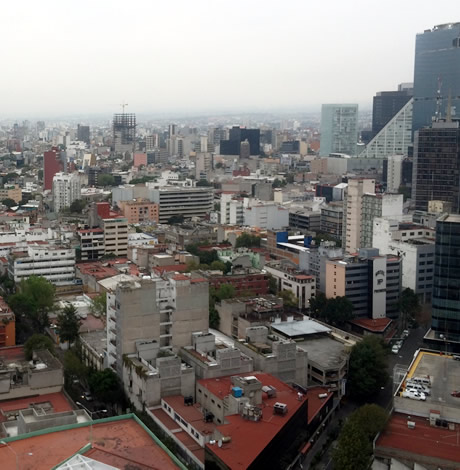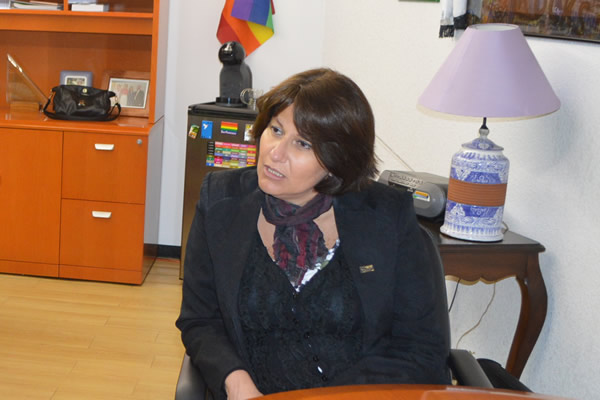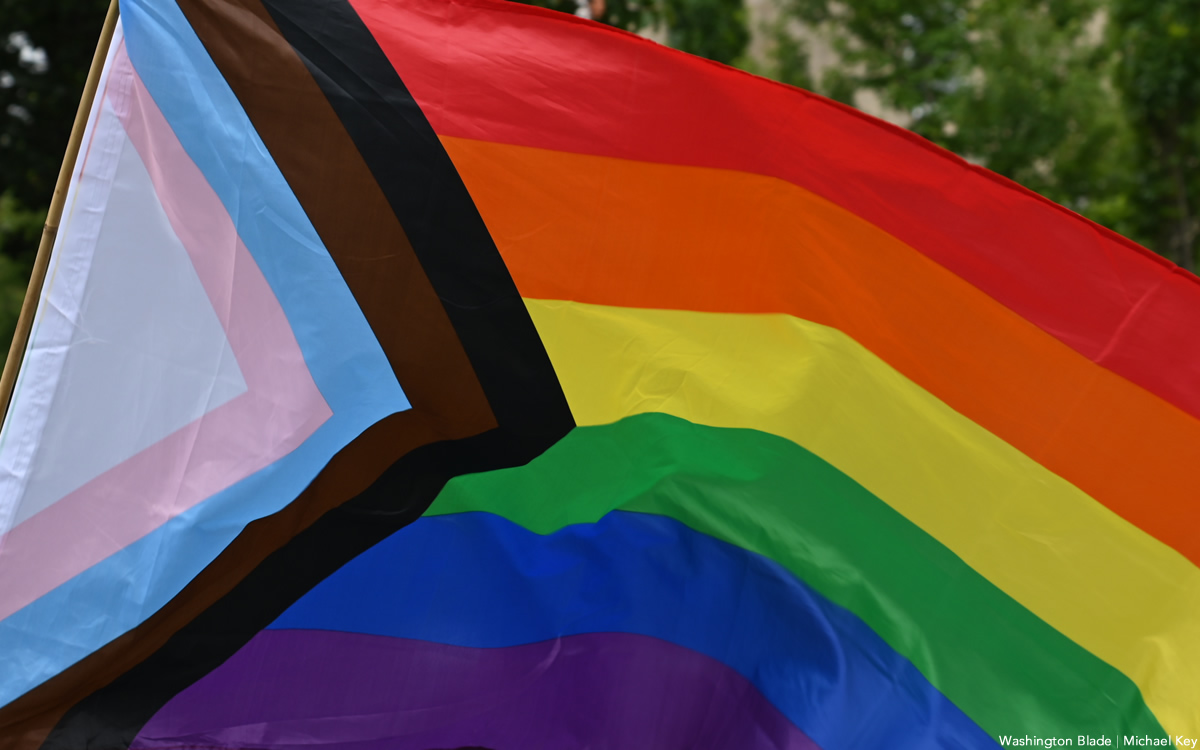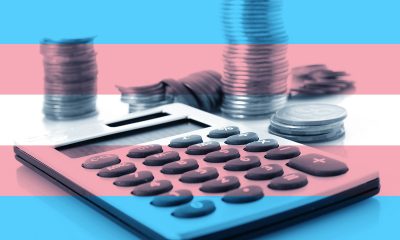News
Mexico City lawmakers approve trans rights bill
Measure to allow legal gender changes without court order


Jacqueline L’Hoist Tapía, president of the Mexico City Council to Prevent and Eliminate Discrimination, supports transgender people’s ability to legally change their gender in the Mexican capital without a court order. (Photo by Angélica Pineda)
Members of Legislative Assembly of the Federal District, in which Mexico City is located, approved the measure by a 42-0 vote margin. Six lawmakers abstained from the vote on the measure that Mexico City Mayor Miguel Ángel Mancera proposed.
Manuel Granados Covarrubias of the Party of the Democratic Revolution, known by the Spanish acronym PRD, welcomed the proposal’s approval.
“It eliminates cumbersome trials and judicial proceedings, procedures, to generate the administrative change of a legal action to which everyone has the right,” said Granados in a press release the Legislative Assembly of the Federal District released after lawmakers approved the measure. “Their dignity is also recognized.”
The Mexico City Commission to Prevent and Eliminate Discrimination, known by its Spanish acronym COPRED, launched a campaign in support of the measure.
COPRED spokesperson René Said Nieto told the Washington Blade that Mexico City on Thursday “took a major step forward” towards the recognition of trans people.
“(The measure) guarantees the rights of people to the recognition of their gender identity,” said the Human Rights Program of the Federal District in a statement.
Mexico City is the first city in Latin America to allow trans people to legally change the gender on their birth certificates without a medical examination. The Mexican capital’s comprehensive anti-discrimination law already includes gender identity and expression and designates transphobia as a form of discrimination.
Argentina President Cristina Fernández de Kirchner in 2012 signed a law that allows trans Argentinians to legally change their gender on official documents without sex-reassignment surgery and an affidavit from a doctor or another medical provider. The Chilean Senate next week is expected to vote on a bill that would allow trans people in the South American country to legally change their name and sex without sex-reassignment surgery.
Supporters of Mariela Castro, daughter of Cuban President Raúl Castro, credit her with successfully lobbying her father’s government to begin offering free sex-reassignment surgery under the country’s national health care system in 2008.
South America
Lesbian couple dies after man sets Buenos Aires boarding house room on fire
Suspect has been charged with homicide

Two people died and at least five others were injured on Monday when a man threw a Molotov cocktail into the room of a Buenos Aires boarding house in which two lesbian couples lived.
The fire took place at around 1 a.m. in a house at 1600 Olavarría St., between Isabel la Católica and Montes de Ocoa in Buenos Aires’s Barracas neighborhood. The blaze forced roughly 30 people to evacuate, and the injured were taken to local hospitals.
Police say Justo Fernando Barrientos, 68, sprayed fuel and set fire to the room where Mercedes Figueroa, 52, lived together with Pamela Fabiana Cobas, 52, and Sofía Castro Riglos, 49, and Andrea Amarante, 42.
Figueroa and Cobas both died. Castro and Amarante are hospitalized at Penna Hospital in Buenos Aires.
Witnesses say the fire started on the second floor when Barrientos threw a Molotov cocktail inside the women’s room, and it soon spread throughout the property. LGBTQ organizations in Argentina have described the blaze as a hate crime because Barrientos had already threatened to kill the women because they are lesbians.
“We are in a rather complex context, where from the apex of power, the president himself and his advisors and downwards permanently instill a hate speech, instilling it when they close the (National Institute Against Discrimination, Xenophobia and Racism or INADI), stigmatizing the population that is there and the vulnerable groups,” Congressman Esteban Paulón, a well-known LGBTQ activist, told the Washington Blade.
“All this is generating a climate of violence,” he said. “The fact that it happened in the city of Buenos Aires, which is terrible … has to be investigated.”
Paulón said President Javier Milei’s government has installed in the public discourse speeches and actions against the LGBTQ community that have provoked more violence based on sexual orientation and gender identity.
“All that is installed … and then there are people who fail to make a mediation of that, that fail to make a critical analysis of that and can end up generating an act of hatred like this, which is tragic and that already took the lives of two people,” he said.
The Argentine LGBT+ Federation on social media said it was looking for the victims’ families and friends, but has yet to be able to connect with them.
“We are going to stand by them, making ourselves available for whatever they and their families need, and we will closely follow the court case so that there is justice,” said the organization. “But we cannot fail to point out that hate crimes are the result of a culture of violence and discrimination that is sustained on hate speeches that today are endorsed by several officials and referents of the national government.”
100% Diversidad y Derechos, another advocacy group, demanded the investigation address the attack “with a gender perspective and as motivated by hatred towards lesbian identity.”
Barrientos has been arrested, and will be charged with murder. Activists have requested authorities add discrimination and hate provisions to the charges.
National
Target limits Pride Month collection sales
Attacks against employees, threats prompted company to remove LGBTQ products in 2023

The Minneapolis-based retail giant Target has announced that it has scaled back availability of its LGBTQ Pride Month collection to select stores and online sales. In May of last year the retailer was forced to remove its LGBTQ merchandise after attacks on employees and emailed threats including bomb threats.
In a media statement to the Washington Blade deflecting on specifics regarding the company’s decision to only offer its Pride collection to only about roughly half of its nearly 2,000 stores nationwide, a spokesperson for Target said:
“Target is committed to supporting the LGBTQIA+ community during Pride Month. Beyond our own teams, we will have a presence at local Pride events in Minneapolis and around the country, and we continue to support a number of LGBTQIA+ organizations. Additionally, we will offer a collection of products for Pride, including adult apparel, home products, food and beverage, which has been curated based on guest insights and consumer research. These items, starting at $3, will be available in select stores and on Target.com.”
In an emailed statement reacting to the news Human Rights Campaign President Kelley Robinson said:
“Pride merchandise means something. LGBTQ+ people are in every zip code in this country, and we aren’t going anywhere. With LGBTQ+ people making up 30 percent of Gen Z, companies need to understand that community members and allies want businesses that express full-hearted support for the community. That includes visible displays of allyship.
Target’s decision is disappointing and alienates LGBTQ+ individuals and allies at the risk of not only their bottom line but also their values.”
In May 2023, police departments in Utah, Ohio, and Pennsylvania aided by assistance from agents from Federal Bureau of Investigation Field Offices in Ohio and Utah investigated threats, including a bomb threat to multiple Utah locations, made by email to local media referencing the retail chain Target’s LGBTQ merchandise collections celebrating Pride Month.
At the time last May, Target spokesperson Kayla Castañeda released a statement from the company:
“For more than a decade, Target has offered an assortment of products aimed at celebrating Pride Month. Since introducing this year’s collection, we’ve experienced threats impacting our team members’ sense of safety, and well-being while at work. Given these volatile circumstances, we are making adjustments to our plans, including removing items that have been at the center of the most significant confrontational behavior. Our focus now is on moving forward with our continuing commitment to the LGBTQIA+ community and standing with them as we celebrate Pride Month and throughout the year.”
Canada
Prominent Ugandan activist asks for asylum in Canada
Steven Kabuye stabbed outside his home on Jan. 3

A prominent Ugandan activist who was stabbed outside his home earlier this year has asked for asylum in Canada.
Two men on motorcycles attacked Steven Kabuye, co-executive director of Coloured Voice Truth to LGBTQ Uganda, on Jan. 3 while he was going to work.
Kabuye posted a video to his X account that showed him on the ground writhing in pain with a deep laceration on his right forearm and a knife embedded in his stomach.
He spoke with the Washington Blade from Kenya on Jan. 8 while he was receiving treatment. Kabuye arrived in Canada on March 6.
Kabuye during an April 27 telephone interview with the Blade from Canada said Rainbow Railroad, a group that works with LGBTQ and intersex refugees, helped him “get away from the dangers that were awaiting me in Kenya and Uganda.” Kabuye said he asked for asylum in Canada because he “cannot return to either Uganda or Kenya.”
“The Ugandan government fails to get the culprits who wanted to end my life,” he said.
Kabuye told the Blade that Ugandan police officials threaten his colleagues when he publicly speaks about his case.
“Every time I come up and demand for the police to act out, they end up calling the colleagues of mine that remain in Uganda and intimidate them so they can scare me off, so they can make me pack up and keep quiet,” he said.
Ugandan President Yoweri Museveni last May signed his country’s Anti-Homosexuality Act that, among other things, contains a death penalty provision for “aggravated homosexuality.”
Canadian Foreign Minister Mélanie Joly described the law as a “blatant violation of human rights and fundamental freedoms of LGBTQ+ Ugandans.”
The U.S. has sanctioned Ugandan officials and removed the country from a duty-free trade program. The World Bank Group also suspended new loans to Uganda in response to the Anti-Homosexuality Act.
The Ugandan Constitutional Court last month refused to “nullify the Anti-Homosexuality Act in its totality.” A group of Ugandan LGBTQ activists have appealed the ruling.
“The previously concluded ruling did not make a difference,” said Kabuye.
Kabuye told the Blade he has an interview with Canadian immigration officials on Friday. He said he will continue to advocate on LGBTQ Ugandans from Canada.
“I’m very grateful to Rainbow Railroad,” said Kabuye. “They’ve still given me a chance to continue my advocacy.”
-

 The White House3 days ago
The White House3 days agoEXCLUSIVE: White House Press Secretary Karine Jean-Pierre on speaking out and showing up
-

 Middle East3 days ago
Middle East3 days agoTel Aviv authorities cancel Pride parade
-

 Maryland5 days ago
Maryland5 days agoTrone discusses transgender niece
-

 The White House4 days ago
The White House4 days agoJane Rigby awarded Presidential Medal of Freedom











